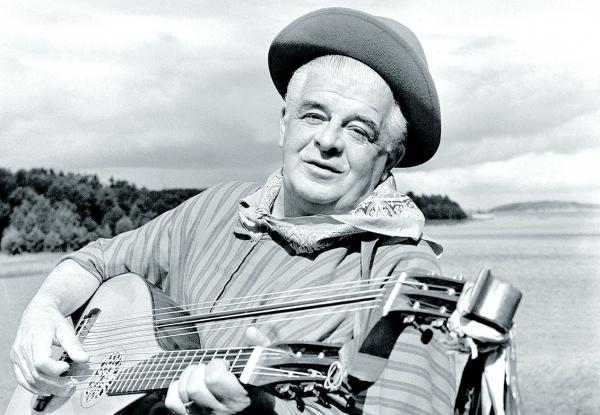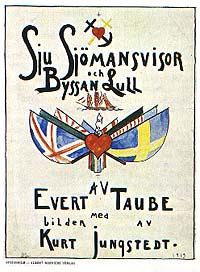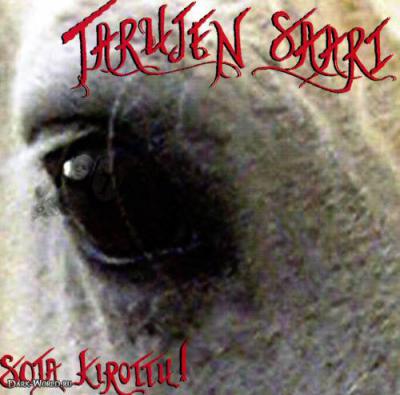Author Evert Taube
Målaren och Maria Pia

Hon stiger som ur himlen ner
(Continues)
(Continues)
Contributed by Riccardo Venturi 2023/3/20 - 11:47
Riccardo Venturi, 20-3-2023 11:49
Il pittore e Maria Pia (Continues)
Byssan lull

[1919]
Rielaborazione di una canzone marinaresca svedese
Su melodia tradizionale svedese e norvegese
Re-elaboration of a Swedish traditional seaman song
To a traditional Swedish/Norwegian tune
En svensk sjömanssång bearbetad av Evert Taube
Svensk/Norsk folkmelodi
One more Swedish fisherman's song; but it may well be a true masterpiece of Swedish balladry of olden times, and also a song reflecting the hard conditions of seamen's life though it has clearly become a very sweet form of lullaby. One might think that there is no direct connection with the topic of this site, but the Finnish band Tarujen Saari, who have translated and sung this song into Finnish (and made a wonderful version of it, indeed) must have disagreed with such a plain opinion, if they have taken the song as it is and included it in a whole antiwar album, Sota kirottu! (2004); the title itself of the album means... (Continues)
Rielaborazione di una canzone marinaresca svedese
Su melodia tradizionale svedese e norvegese
Re-elaboration of a Swedish traditional seaman song
To a traditional Swedish/Norwegian tune
En svensk sjömanssång bearbetad av Evert Taube
Svensk/Norsk folkmelodi
One more Swedish fisherman's song; but it may well be a true masterpiece of Swedish balladry of olden times, and also a song reflecting the hard conditions of seamen's life though it has clearly become a very sweet form of lullaby. One might think that there is no direct connection with the topic of this site, but the Finnish band Tarujen Saari, who have translated and sung this song into Finnish (and made a wonderful version of it, indeed) must have disagreed with such a plain opinion, if they have taken the song as it is and included it in a whole antiwar album, Sota kirottu! (2004); the title itself of the album means... (Continues)
Byssan [*] lull, koka kittelen full,
(Continues)
(Continues)
Contributed by Riccardo Venturi 2015/5/11 - 16:47

Finnish version by Tarujen Saari
Tarujen Saaren suomennos
Tarujen Saaren suomennos
From the album Sota kirottu! (Cursed war!), 2004. Finnish translation by Kaisa Saari. Il testo è stato trascritto da Juha Rämö.
Dall'album Sota kirottu! (Maledetta la guerra!), 2004. Traduzione finlandese di Kaisa Saari. Lyrics transcribed by Juha Rämö.
Dall'album Sota kirottu! (Maledetta la guerra!), 2004. Traduzione finlandese di Kaisa Saari. Lyrics transcribed by Juha Rämö.
KOLME
(Continues)
(Continues)
Contributed by Riccardo Venturi 2015/5/11 - 17:02
For Juha Rämö. Dear Juha, I kindly ask you a service. The Finnish lyrics of Tarujen Saari's Kolme are no more available in the Web, as they used to be some years ago, when the band's site was still active. Sadly enough, I've never transcribed the lyrics of this wonderful song when it was still possible to do it; to add something to my stupidness, I got all the lyrics of the band directly from Kaisa Saari, the singer, who sent me an e-mail I didn't save in a file, and God only knows where in the universe this e-mail must be now. Could you be so kind as to transcribe them and put it into the site? Thank you!
Riccardo Venturi 2015/5/11 - 17:23

11 maggio 2015
Ancora una canzone marinaresca svedese; ma si tratta probabilmente di un vero capolavoro delle antiche ballate marinaresche di quel paese, e anche un canto che riflette le dure condizioni di vita dei marinai, sebbene sia diventato una forma di ninna-nanna assai dolce. Si potrebbe pensare che non esista alcuna connessione diretta con l'argomento di questo sito, ma la band finlandese dei Tarujen Saari, che ha tradotto la canzone in finlandese (facendone una versione meravigliosa), non deve averla pensata allo stesso modo se ha inserito la canzone in un intero album contro la guerra, Sota kirottu! (2004); il titolo stesso dell'album significa "Maledetta la guerra!".
È un'antica canzone che il grande Evert Taube rese popolare nel 1919; secondo la testimonianzadi Uno Myggan Ericson, Evert Taube improvvisò la canzone "sul suo liuto in una tranquilla serata d'agosto a Skågen".... (Continues)
Ancora una canzone marinaresca svedese; ma si tratta probabilmente di un vero capolavoro delle antiche ballate marinaresche di quel paese, e anche un canto che riflette le dure condizioni di vita dei marinai, sebbene sia diventato una forma di ninna-nanna assai dolce. Si potrebbe pensare che non esista alcuna connessione diretta con l'argomento di questo sito, ma la band finlandese dei Tarujen Saari, che ha tradotto la canzone in finlandese (facendone una versione meravigliosa), non deve averla pensata allo stesso modo se ha inserito la canzone in un intero album contro la guerra, Sota kirottu! (2004); il titolo stesso dell'album significa "Maledetta la guerra!".
È un'antica canzone che il grande Evert Taube rese popolare nel 1919; secondo la testimonianzadi Uno Myggan Ericson, Evert Taube improvvisò la canzone "sul suo liuto in una tranquilla serata d'agosto a Skågen".... (Continues)
NANNA, PICCINO
(Continues)
(Continues)
×
![]()

Testo e musica / Text och musik / Lyrics and music / Paroles et musique / Sanat ja sävel: Axel Evert Taube
Axel Evert Taube (1890-1976) è stato senz'ombra di dubbio il più celebre e rispettato cantante svedese del XX secolo. Nato a Göteborg, proveniva da un'antica e nobile casata baltica tedesca stanziata in Svezia fin dal 1668; il suo cognome, che in tedesco significa “Colomba”, avrebbe quindi dovuto essere pronunciato alla lettera come in tedesco (tàube). Ma in Svezia lo si è sempre pronunciato alla francese, “tób”. In linea di massima, Evert Taube è stato il principale interprete di ballate tradizionali svedesi; ne abbiamo un esempio in questo sito con la bellissima Byssan lull, da lui scritta nel 1919 rielaborando un'antico canto marinaresco. Evert Taube era, in effetti, come l'apostolo dei canti marinareschi, che aveva cominciato a raccogliere e cantare fin da giovanissimo.... (Continues)